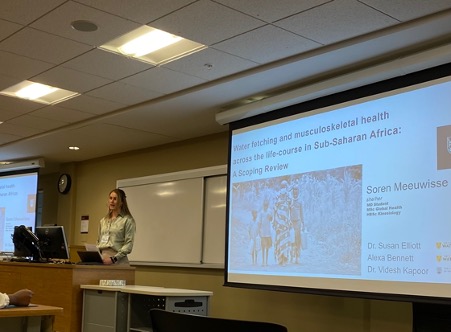Global Health alumna Celia Walker’s climate reckoning: “As the world gets sicker, so do we”

 According to the World Health Organization, climate change is the greatest threat to global health in the 21st century. But MSc Global Health program alumna Celia Walker says the relationship between climate change and human health is often misunderstood by the public and overlooked within policy-level decision-making. The problem, she explains, is that climate change is too often framed solely as an environmental or an economic issue. So, in an effort to shift the climate change narrative, she created a video for a project with mentorship program Climate Guides to communicate the connection between our health and our planet’s health.
According to the World Health Organization, climate change is the greatest threat to global health in the 21st century. But MSc Global Health program alumna Celia Walker says the relationship between climate change and human health is often misunderstood by the public and overlooked within policy-level decision-making. The problem, she explains, is that climate change is too often framed solely as an environmental or an economic issue. So, in an effort to shift the climate change narrative, she created a video for a project with mentorship program Climate Guides to communicate the connection between our health and our planet’s health.
“When climate change is framed as a health issue, it puts a human face on it, and becomes clear that we’re facing an immediate predicament that strikes at the heart of humanity,” explains Walker.
While working on a research project in Northern British Columbia, Walker had what she calls a ‘climate reckoning’ – an ‘aha moment’ that motivated her to look deeper into the ways in which climate change is impacting the health of people right here in Canada. Reading through charts of children from northern communities admitted to hospital with infectious diseases over the last 15 years, she noticed trends. “I started to see high rates of respiratory illness and asthma exacerbations from areas close to extractive industry and communities that have been subjected to extreme wildfire seasons,” she explains.
Currently, Walker is a research coordinator working in infectious diseases at the BC Children’s Hospital in Vancouver, in addition to her role as a mentee with Climate Guides, a hands-on program that connects youth leaders with professional mentors addressing climate change. Her involvement with Climate Guides has also led her to join the Canadian Association of Physicians for the Environment (CAPE), an organization of health professionals working to protect the environment in order to protect human health.
Walker’s studies in global health have taken her from classes in Hamilton to an exchange in the Netherlands, to learning about traditional health care in India, to working on a clinical trial in Botswana. “After a year of studying global health, I came to the realization that as the world gets sicker, so do we,” says Walker. “In most cases, we can’t divorce the major global health challenges we’re facing today from the threat of climate change,” she explains.
When Walker started to interview physicians about the relationship between climate change and human health here in Canada for the Climate Guides video, she felt even more compelled to act.
“Physicians are often the frontline responders to the health effects of climate change – so when I heard their stories, it made me realize I needed to do something,” she says.
It starts with changing the dialogue.
“Whether we’re talking about Lyme disease, cholera, heat-related deaths, mass starvation and malnourishment, threatened basic needs such as food productivity and water availability, or injury from natural disasters including storms and floods – let’s connect the dots and make health solutions and climate solutions part of the same conversation,” she says.
“Health is something we can all relate to, so perhaps it can provide a unifying key to get people on the same page when it comes to talking about climate action.”
Student and Alumni Profiles
Related News
News Listing

A Journey from Research to Advocacy: Global Health Alumna’s Impact on Health Equity
Student and Alumni Profiles
October 17, 2024

“My work does not only come from a place of intellectual curiosity, but also shared grief”: Dr. Zoha Salam’s Journey as the Second Global Health Doctoral Program Graduate
Global Health News, Student and Alumni Profiles
June 20, 2024

PhD Student Tackling Intimate Partner Violence in Resource-Constrained Settings Receives an IDRC Doctoral Research Award
Student and Alumni Profiles
February 28, 2024
